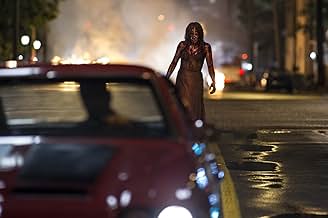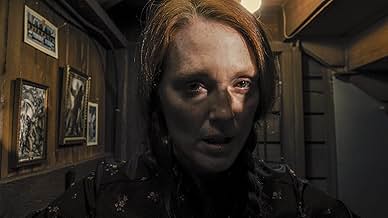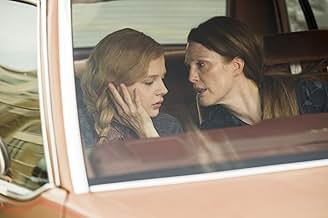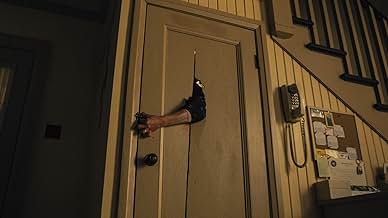Uma garota tímida, rejeitada por seus colegas de classe e protegida por sua mãe religiosa, desencadeia o terror telecinético em sua pequena cidade após sofrer uma brincadeira de mal gosto du... Ler tudoUma garota tímida, rejeitada por seus colegas de classe e protegida por sua mãe religiosa, desencadeia o terror telecinético em sua pequena cidade após sofrer uma brincadeira de mal gosto durante o baile de formatura.Uma garota tímida, rejeitada por seus colegas de classe e protegida por sua mãe religiosa, desencadeia o terror telecinético em sua pequena cidade após sofrer uma brincadeira de mal gosto durante o baile de formatura.
- Prêmios
- 6 vitórias e 7 indicações no total
Eddie Max Huband
- Harry Trenant
- (as Eddie Huband)
- Direção
- Roteiristas
- Elenco e equipe completos
- Produção, bilheteria e muito mais no IMDbPro
Enredo
Você sabia?
- CuriosidadesBecause Chloë Grace Moretz was a minor, she was limited to eight hours of work per day. When she was unavailable, director Kimberly Peirce substituted; she would be off-screen. This was only done with scenes that Julianne Moore would talk to Carrie.
- Erros de gravaçãoWhen Tommy collapses on the stage, he is facing Carrie, but when Carrie tries to cradle Tommy, he is facing the backdrop.
- Citações
Sue Snell: No! Carrie please don't hurt me.
Carrie White: Why not? I've been hurt my whole life.
- Versões alternativasThe theatrical version ends with a brief scene of Sue in court for the White Investigation (an integral part of the Stephen King novel otherwise omitted from the film) and then laying a flower on Carrie White's grave, which cracks as she walks away. The alternate Blu-ray cut omits the courtroom scene and features a different edit of Sue placing the flower on Carrie's grave. This scene is followed with Sue in the delivery room giving birth, but instead of a baby, Carrie's arm emerges from between her legs and grabs her. There is then a quick cut to Sue's mother, who is holding and trying to awaken her hysterical, pregnant daughter from this nightmare.
- Trilhas sonorasEnd of the Earth
Written by Ben Schneider
Performed by Lord Huron
Courtesy of IAMSOUND Records
By arrangement with Sony Music Licensing
Avaliação em destaque
How well you respond to the new remake of "Carrie" may depend greatly on how your mind is associated with the material that inspired it. If this is your introduction to this enterprise, it may be kind to suggest that you check out Brian DePalma's original 1976 horror classic, or Stephen King's 1974 debut novel. That's where you get the true meat of the story. Kimberly Peirce's remake is glossy, pretty and professionally made, but it adds almost nothing new. It is violent and energetic, but it lacks the sustained melancholy creepiness that made the original so memorable. Peirce has the parts of the story in the right order but her film lacks a sense of tone and mood. She can play the notes, but not the music.
DePalma's film remains a permanent fixture of our popular culture because he understood that the foundation of Stephen King's best work comes from his ability to pry supernatural events out of a foundation of realism – i.e. the more realistic his environment, the scarier the magical stuff plays out. Plus, it had the added bonus of a previously unknown actress named Sissy Spacek in a brilliant performance that made her a star. Knowing that, it may be possible that no filmmaker could have revised this material. By this point there may not be anything new to explore. After the book, the 1976 movie, a 1999 sequel and a 2002 TV movie, we know this story so well that the narrative of a remake is more or less perfunctory. It becomes less a story and more of a checklist keywords: prom, dirty pillows, pig blood, tampons, prayer closet, telekinesis. The pieces are here, but there are very few surprises.
The story is one of alienation. We know that the world is populated with more young people like Carrie then than the prom queens who torment her, and with all the news stories lately about the horrors of bullying, this new film might have been a good chance to shed some light on the subject. Yet, there seems to have been no ambition to expand on the original idea. Pierce, who is openly gay, understands alienation first hand. She previously made "Boys Don't Cry," the story of Brandon Teena, a girl suffering a sexual identity crisis (for that film Hilary Swank got an Oscar for Best Actress). She also made "Stop-Loss" about a soldier who returns home from Iraq, but refuses to go back. Here, in her first big commercial film, she seems to have lost her creative edge. The movie is long on plot but very short on personality.
One of the biggest problems lies in the casting of Chloë Grace Moretz in the title role. She's so conventionally pretty that we have trouble believing that she could ever be a wallflower. This is a story about a girl who is so spaced away from the world that she might as well be invisible. She's trapped in a body that offers a telekinetic ability that she can neither control nor adequately explain. Moretz is not a bad actress, but she has such a strong screen presence that we don't feel her defenselessness.
The people around Carrie aren't people, so much as standard movie requirements. There's the snobbish queen bee (Portia Doubleday) who torments Carrie at school. There's her lunkhead boyfriend (Alex Russell) who acquires the pig blood. There's the nice guy (Ansel Elgort) who agrees to take Carrie to prom. There's the P.E. coach (Judy Greer) who defends Carrie against her tormentors. There's the principal (Barry Shabaka Henley) who is so petrified of a lawsuit that he can hardly speak. These characters aren't given personalities; they are just functions of the plot.
The one performance in the film that does work is Julianne Moore as Carrie's hyper-religious mother, Margaret. Moore does a nice job of playing a woman so encased in her own God-fearing paranoia that she shuts out a world that she feels pleasures itself at the altar of a fallen creation – which includes pretty much everyone. The worst of this vantage point she pushes on Carrie herself, locking her in a closet and declaring that her special power makes her a tool of the devil. The set designer has done a good job of creating Margaret and Carrie's home as a sponge-cleaned den of claustrophobia and blandness.
The scenes between Carrie and her mother are the best parts of this story because they reveal two broken personalities that eventually face off in a final conflict that seems to have been preordained from the moment that Carrie came into the world. The rest of the movie is pretty much a tired march through a story that's been told three times before. There are some nice touches. The prom scene is well made. Peirce allows Moretz to wave her arms during the final telekinetic fury as if she were conducting a symphony of terror and mayhem. Yet, it's a moment of originality so clever that you wish the rest of the movie had followed.
Is "Carrie" entertaining? Not really. If you know this story already, there's no real reason to see this one. It only goes to further the mystery of why remakes are even necessary. Why remake this movie beyond the attempt to cash in on a brand name? Why not remake movies that were bad? Make them better. 37 years after the Brian DePalma's masterwork, horror fans are still talking about it. This film is so forgettable that 37 years after this remake, horror fans may have to be reminded that it was ever made in the first place.
** (of four)
DePalma's film remains a permanent fixture of our popular culture because he understood that the foundation of Stephen King's best work comes from his ability to pry supernatural events out of a foundation of realism – i.e. the more realistic his environment, the scarier the magical stuff plays out. Plus, it had the added bonus of a previously unknown actress named Sissy Spacek in a brilliant performance that made her a star. Knowing that, it may be possible that no filmmaker could have revised this material. By this point there may not be anything new to explore. After the book, the 1976 movie, a 1999 sequel and a 2002 TV movie, we know this story so well that the narrative of a remake is more or less perfunctory. It becomes less a story and more of a checklist keywords: prom, dirty pillows, pig blood, tampons, prayer closet, telekinesis. The pieces are here, but there are very few surprises.
The story is one of alienation. We know that the world is populated with more young people like Carrie then than the prom queens who torment her, and with all the news stories lately about the horrors of bullying, this new film might have been a good chance to shed some light on the subject. Yet, there seems to have been no ambition to expand on the original idea. Pierce, who is openly gay, understands alienation first hand. She previously made "Boys Don't Cry," the story of Brandon Teena, a girl suffering a sexual identity crisis (for that film Hilary Swank got an Oscar for Best Actress). She also made "Stop-Loss" about a soldier who returns home from Iraq, but refuses to go back. Here, in her first big commercial film, she seems to have lost her creative edge. The movie is long on plot but very short on personality.
One of the biggest problems lies in the casting of Chloë Grace Moretz in the title role. She's so conventionally pretty that we have trouble believing that she could ever be a wallflower. This is a story about a girl who is so spaced away from the world that she might as well be invisible. She's trapped in a body that offers a telekinetic ability that she can neither control nor adequately explain. Moretz is not a bad actress, but she has such a strong screen presence that we don't feel her defenselessness.
The people around Carrie aren't people, so much as standard movie requirements. There's the snobbish queen bee (Portia Doubleday) who torments Carrie at school. There's her lunkhead boyfriend (Alex Russell) who acquires the pig blood. There's the nice guy (Ansel Elgort) who agrees to take Carrie to prom. There's the P.E. coach (Judy Greer) who defends Carrie against her tormentors. There's the principal (Barry Shabaka Henley) who is so petrified of a lawsuit that he can hardly speak. These characters aren't given personalities; they are just functions of the plot.
The one performance in the film that does work is Julianne Moore as Carrie's hyper-religious mother, Margaret. Moore does a nice job of playing a woman so encased in her own God-fearing paranoia that she shuts out a world that she feels pleasures itself at the altar of a fallen creation – which includes pretty much everyone. The worst of this vantage point she pushes on Carrie herself, locking her in a closet and declaring that her special power makes her a tool of the devil. The set designer has done a good job of creating Margaret and Carrie's home as a sponge-cleaned den of claustrophobia and blandness.
The scenes between Carrie and her mother are the best parts of this story because they reveal two broken personalities that eventually face off in a final conflict that seems to have been preordained from the moment that Carrie came into the world. The rest of the movie is pretty much a tired march through a story that's been told three times before. There are some nice touches. The prom scene is well made. Peirce allows Moretz to wave her arms during the final telekinetic fury as if she were conducting a symphony of terror and mayhem. Yet, it's a moment of originality so clever that you wish the rest of the movie had followed.
Is "Carrie" entertaining? Not really. If you know this story already, there's no real reason to see this one. It only goes to further the mystery of why remakes are even necessary. Why remake this movie beyond the attempt to cash in on a brand name? Why not remake movies that were bad? Make them better. 37 years after the Brian DePalma's masterwork, horror fans are still talking about it. This film is so forgettable that 37 years after this remake, horror fans may have to be reminded that it was ever made in the first place.
** (of four)
- The_Film_Cricket
- 18 de out. de 2013
- Link permanente
Principais escolhas
Faça login para avaliar e ver a lista de recomendações personalizadas
Detalhes
Bilheteria
- Orçamento
- US$ 30.000.000 (estimativa)
- Faturamento bruto nos EUA e Canadá
- US$ 35.266.619
- Fim de semana de estreia nos EUA e Canadá
- US$ 16.101.552
- 20 de out. de 2013
- Faturamento bruto mundial
- US$ 84.790.678
- Tempo de duração1 hora 40 minutos
- Cor
- Mixagem de som
- Proporção
- 2.35 : 1
Contribua para esta página
Sugerir uma alteração ou adicionar conteúdo ausente




























